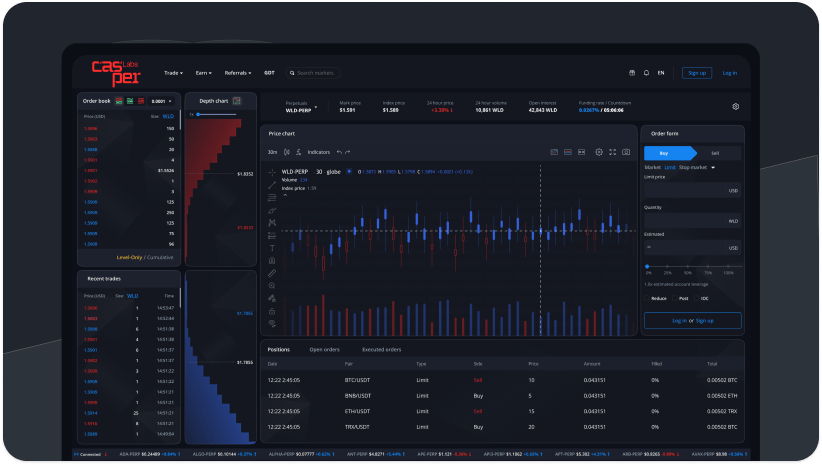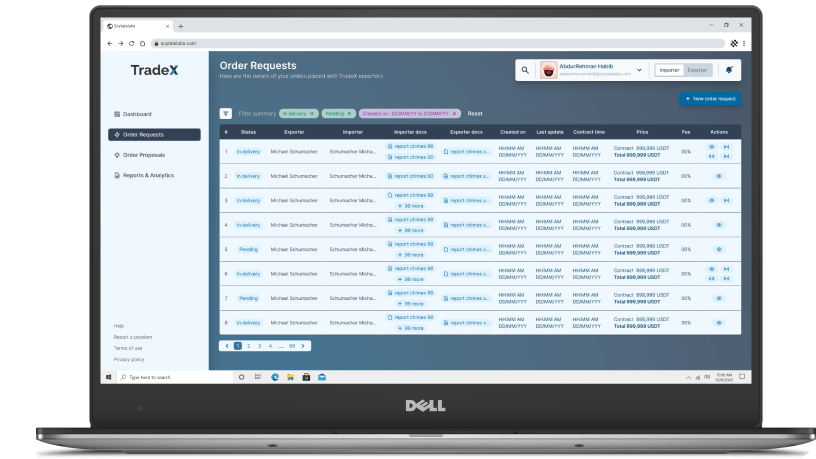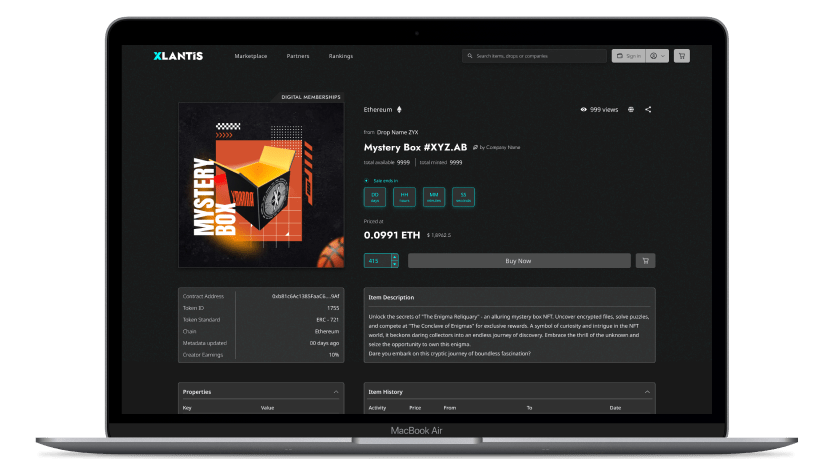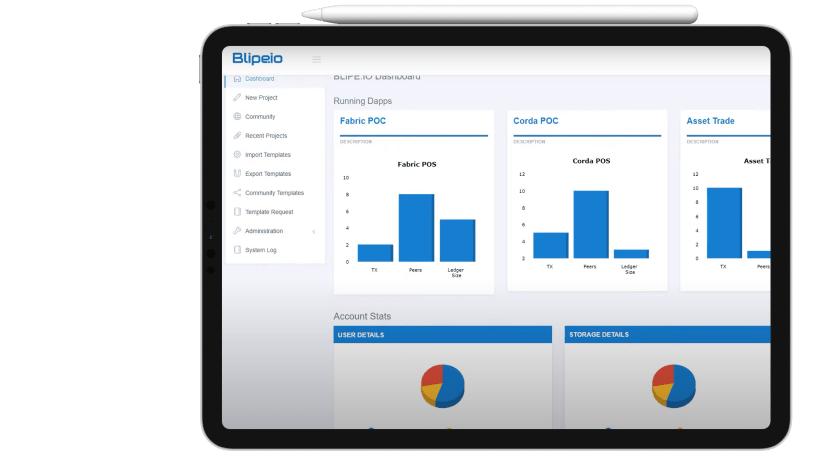
Unlocking Business Value with Blockchain Technology
Explore the myriad ways blockchain technology can drive business advantages, from enhanced visibility to real-time reporting. Applications vary, leveraging the ledger’s synchronicity to streamline reconciliation or eliminating intermediaries for cost efficiency and impartiality. Another group focuses on hosting smart contracts, automating and ensuring secure contractual arrangements and transactions.
Discover our Case Studies below.
Scytalelabs Develops Uniswap Exchange Alternative for CapserLabs Blockchain

Many cryptocurrency holders need more choices to exchange their holdings for other cryptocurrencies.
Currently, their exchange option is through the ‘Uniswap’ exchange.
However, if a user’s cryptocurrencies are on a specific blockchain and that blockchain is not supported by Uniswap exchange, then that user cannot exchange his holdings into another cryptocurrency.
Scytalelabs, a leading blockchain development company, was approached by a customer to create an alternative to Uniswap for their CapserLabs blockchain.
Problem
- The main challenge for Scytalelabs was to create a decentralized exchange (DEX) that could provide the same functionality as Uniswap exchange while running on the CapserLabs blockchain.
- This involved developing smart contracts in RUST, a relatively new language, and ensuring they were secure and efficient. In addition, the team had to create contract indexing services that would allow users to access and interact with the contracts on the blockchain quickly.
- They also had to design and develop a user-friendly front-end UI/UX to make it easy for users to trade assets on the exchange, thus enabling rapid adoption.
- CapserLabs is a next-generation blockchain platform that provides a scalable and secure infrastructure for decentralized applications.
Solution
- To overcome these challenges, Scytalelabs assembled a team of experienced blockchain developers who were familiar with RUST and had a deep understanding of smart contract development.
- The team used best practices and industry standards to ensure the security and efficiency of the smart contracts. The contracts have passed two independent code audits to ensure quality and security.
- The team developed the backend services in Node.js and used Kafka for message streams and Redis for caching. They also created contract indexing services that allowed users to easily search for and interact with the contracts on the blockchain
- To create the front-end UI/UX, Scytalelabs worked closely with the customer to understand their requirements and user needs. They designed and developed a user-friendly interface using React.
- The team used AWS for deployment and Git for version management.
Outcome
- Scytalelabs successfully developed an alternative to Uniswap for the CapserLabs blockchain. The exchange provides the same functionality as Uniswap, including swapping tokens, providing liquidity, and earning fees.
- The contracts are secure and efficient and have passed two independent code audits to ensure their quality and security. The contract indexing services make it easy for users to interact with the contracts on the blockchain, and the front-end UI/UX is user-friendly and has received positive feedback from users.
Blockchain-Based Sustainable Apparel Supply Chain Solution

Problem
- The fashion industry is one of the largest polluters in the world. As consumers become increasingly conscious of the environmental impact of their choices, there is growing pressure on apparel businesses to operate sustainably.
- In response, we developed a blockchain-based solution that enabled our client, a leading apparel brand, to track carbon emissions and United Nations Sustainable Development Goals (UNSDG) throughout the supply chain.
- The solution provided transparency and traceability, allowing our clients to take concrete steps toward meeting their sustainability goals and making their businesses more sustainable.
Solution
- Our solution tracked carbon emissions from the cradle to the grave and allowed for the tracking of products and raw materials throughout the supply chain. We also added carbon and UNSDG scoring to raw materials as they moved through the supply chain. The system also complied with data privacy laws, including GDPR. Here’s how we implemented and executed the solution:
- Technical White Paper: We wrote a comprehensive technical white paper outlining the vision, which served as the foundation for the solution.
Data Gathering for UNSDG: We developed surveys and forms for data gathering for UNSDG. - Mobile App for Data Gathering: We built a mobile app to gather data and track UNSDG and carbon emissions at the farm level. We customized the app to address organizational and operational hierarchies in African countries and solved low-fi mobile device access and intermittent internet connectivity.
- Hardware Technology Provider: We worked with a hardware technology provider to customize hardware for the blockchain interface.
- Access Control and Approval Mechanisms: We implemented access control and approval mechanisms for all farmland stakeholders.
- Liaison between Development and Innovation Teams: We acted as a liaison between development and innovation teams for successful project execution.
Consumer-Facing App: We helped brands develop labels that could be placed on clothes, not in the app. Consumers could scan the QR code attached to each product label if they needed more information.
Outcome
- Our solution helped our client to take their apparel business to the next level of sustainability.
- Tracking carbon emissions and UNSDG throughout the supply chain gave consumers a convenient way to make more informed decisions. We enabled our clients to take concrete steps towards meeting their sustainability goals.
- We are proud to have played a role in making the fashion industry more sustainable and look forward to continuing to work with clients to achieve their sustainability goals.
Scytalelabs Develops Prototype for DHS (Dept. Of Homeland Security) Passport & Immigration Services

Scytalelabs is a technology company that specializes in developing secure and innovative solutions for complex identity and access management challenges. In response to the Department of Homeland Security’s (DHS) call for proposals, Scytalelabs submitted a grant application proposing a prototype to prevent document fraud using Self Sovereign Identities powered by blockchain. The prototype addressed the two Technical Topic Areas (TTAs) outlined by DHS, which were the issuance and verification of certificates, licenses, and attestations and the storage and management of certificates, licenses, and attestations.
Problem
The current DHS passport and immigration services process involves a high level of manual effort and is prone to errors and inefficiencies. DHS requires a solution that can automate the process while ensuring that the system is secure and compliant with Federal Information Processing Standards (FIPS) and National Institute of Standards and Technology (NIST) guidelines. Additionally, the solution should provide privacy and confidentiality for users while reducing the risk of identity theft and fraud. The solutions required were split into three Technical Topic Areas (TTA’s):
- Issuance and Verification of Certificates, Licenses and Attestations
- Storage and Management of Certificates, Licenses and Attestations
- Decentralized and Derived PIV Credentials
DHS sought solutions that solved for the following problems:
- Globally Unique Identifier without the need for a central registration authority which could be standardized using W3C allowing them to be
- Immutable
- Resolvable
- Cryptographically Verifiable
2 .The use of Verifiable Credentials to allow for Data Interoperability across issuers holders and verifiers
- Standardization of data formats
- Standardization of digital signature schemes
3. Digital version of physical credentials/attestations
- Driver’s Licenses
- Passports
- Training Certificates
- Educational Certificates
4. Championing Globally Interoperable Specifications
- Multi-Party Distributed Key Management
- Tackling the hard challenge of distributed key management
- Provisioning
- Revocation
- Re-Issuance
- Based on NIST Special Publication 800-130: A Framework for Cryptographic Key Management
Solution
Scytalelabs digital identity solution addressed both TTA #1: Issuance and Verification of Certificates, Licenses and Attestations and TTA #2: Storage and Management of Certificates, Licenses and Attestations. The digital document issuance system developed is better than conventional paper-based systems in ease of use, speed of use, and security. Our solution benefits both the end users and the agencies by empowering both. Users enjoy control over their data while the agencies control authority over the data. Our system is a better alternative to a paper-based system in that it offers more value than a paper-based system without the drawbacks. The most innovative aspect of this system is that like paper-based systems, the users own and control their data—data can only ever be released with the user’s consent. Thereby, this system affords the same level of privacy as when using paper-based credentials; the authorities do not need to know if the credential has been presented elsewhere. In addition, unlike presenting a physical card, which reveals all the data, this system enables the user to disclose relevant data only—without any compromise on security, authenticity or provenance. The system also resolves the “phone home” problem for authorities; authorities can easily verify whether a credential has been revoked or suspended.
Our solution is designed on top of recent technological breakthroughs such as the Blockchain. We adhere to the evolving technology standards which have been championed and funded by DHS. Our solution is built on top of Sovrin Network, a public but permissioned blockchain network that has been designed to specifically deal with DIDs and self-sovereign identities. We chose Hyperledger Indy to develop the application layer, for it supports Sovrin but is not bound to it. It can be tailored to use any Blockchain network that supports operations on DIDs. Indy allows us to use modern technologies and standards such as Zero Knowledge proofs and verifiable credentials to bring to life our FIPS and NIST 800-63 compatible solutions.
Our solution alleviates user concerns over privacy and security of their data by putting them in control of their own data. It helps the agencies to retain authority over issued data; they can safely revoke or suspend credentials as needed. We envision our solution to become the forerunner for digital adoption across Federal departments in the United States wherever digital credentials matter.
The only limitation of the current solution is the use of FIDO UAF instead of FIDO U2F which makes this solution miss TTA #3. We can incorporate or change over to U2F in the future since the authentication and verification are decoupled in the architecture. However, it must be noted that the decision to go with UAF is a deliberate choice to enhance usability and ease of use, to make the product’s adoption quick and its commercial success a reality.
Outcome
Scytalelabs successfully demonstrated its ability to develop innovative and secure solutions for complex identity and access management challenges. The prototype proposed and developed for DHS passport and immigration services addressed the two TTAs, namely the issuance and verification of certificates, licenses, and attestations, and the storage and management of certificates, licenses, and attestations. The solution was designed to be compliant with the highest security standards and provided an extra layer of security and privacy for users. The incorporation of FIDO authentication added an extra layer of security and convenience, making the process of identity verification faster and more efficient.
Smart Contract-Based Escrow Management To Revolutionize Conventional Trading Operations

Problem
- Faced with considerable difficulties in their trading operations, our client, a prominent import-export firm, grappled with the complexities and drawbacks inherent in their intermediary-dependent process. High transaction costs, persistent delays, and escalating security threats impeded operations and decreased customer satisfaction.
In search of an effective resolution, they enlisted the expertise of Scytalelabs. Their objective was to conceive and construct a platform capable of refining their trading procedures and eradicating the need for intermediaries. - In response, we developed a blockchain-based solution that enabled our client, a leading apparel brand, to track carbon emissions and United Nations Sustainable Development Goals (UNSDG) throughout the supply chain.
- The solution provided transparency and traceability, allowing our clients to take concrete steps toward meeting their sustainability goals and making their businesses more sustainable.
Solution
- Scytalelabs developed IMEX, a groundbreaking platform that uses smart contract-based escrow management to facilitate direct trade between importers and exporters.
- The platform eliminates intermediaries, reducing transaction costs and improving the efficiency of the process. Smart contracts ensure the security of transactions, guaranteeing the availability of funds and managing their release.
- IMEX offers dashboards for importers, exporters, and admins to track and update shipment statuses. Using stablecoins, which are pegged to the US dollar, mitigates the high volatility of cryptocurrencies, ensuring secure transactions.
- The platform allows for fees to be collected for the services offered, which are a fraction of the cost of a conventional letter of credit, providing significant cost savings for the client.
- In case of disputes, the platform offers admin-based arbitration, allowing for fair and transparent resolution. The admin can move funds in either direction or split them based on the arbitration decision, reducing the risk of costly legal battles.
- IMEX is a game-changing platform that offers a secure, efficient, and cost-effective solution for conventional trading operations. Smart contract-based escrow management eliminates intermediaries, reducing transaction costs and improving efficiency.
- The platform’s dashboards provide transparency throughout the process, while admin-based arbitration offers a fair and transparent way to resolve disputes. IMEX has revolutionized the client’s trading operations, resulting in significant cost savings and increased customer satisfaction.
- The platform has set a new standard for conventional trading operations, offering a streamlined and secure solution for importers and exporters seeking to trade goods without intermediaries.
Outcome
- IMEX has revolutionized the clients’ trading operations, enabling them to trade goods directly with their partners, reducing transaction costs, and improving the efficiency of the process. Eliminating intermediaries has also reduced security risks and improved the speed of the process.
- The client has reported significant cost savings and increased customer satisfaction due to the streamlined process.
Xmanna Skilled Game Implementation on Blockchain

Xmanna, a skilled gaming service, approached Scytalelabs to help bring their vision of a blockchain-based platform to life.
Scytalelabs worked closely with Xmanna to develop a comprehensive solution that would support the efficient collection and dispersal of funds for games and ensure fairness in gameplay.
The result was a flexible system that could be moved to any EVM-compatible blockchain.
Solution
- White Paper Development: Scytalelabs collaborated with Xmanna to develop a white paper that outlined their vision for a blockchain-based gaming platform. This involved identifying the requirements for the platform, designing the technical architecture, and establishing the protocols for smart contract development.
- Smart Contract Development: Scytalelabs developed smart contracts that supported Xmanna’s proprietary patented logic. These contracts were designed to ensure that games were fair and that funds were collected and dispersed efficiently.
- Blockchain Service Development: Scytalelabs developed a blockchain service that sat between the blockchain and the SDKs, allowing games to communicate with the blockchain. This ensured that gameplay was fair and funds were efficiently collected and dispersed.
- Quorum to Polygon Migration: The initial version of the platform was built using the Quorum blockchain but was later migrated to the Polygon blockchain to take advantage of its scalability and lower transaction fees.
- Backend Development: The backend services for the platform were written using Nest.js, a scalable Node.js framework. Some components used for state synchronization relied on Timescale DB.
Outcome
- Scytalelabs’ solution for Xmanna was a success. The ScytaleLabs built platform ensured that gameplay was fair, and funds were efficiently collected and dispersed.
- The platform was also flexible enough to be moved to any EVM-compatible blockchain, making it scalable and adaptable for future needs.
Help Xlantis Tokenize In-Game Assets Using NFTs

Xlantis is a gaming company that creates virtual worlds and metaverses. To enhance user experience, they wanted to incorporate Non-Fungible Tokens (NFTs) into their gaming ecosystem.
They approached Scytalelabs, a blockchain development company, to create an NFT backend service that could tokenize their in-game assets and make them available on the blockchain.
Solution
- During the project’s inception, Scytalelabs was confronted with a notable hurdle concerning file formats. Open standards negatively impacted the integrity of the digital assets, necessitating the employment of proprietary file formats to uphold AAA-quality visuals.
- Moreover, the team ensured these assets would remain confidential and not be disclosed to the public through blockchain integration.
- To navigate this, Scytalelabs employed a resourceful approach, linking and identifying metaverse assets with digital tokens on the blockchain. To this end, an API was designed to interact with the Unreal-engine-based metaverse, empowering it to generate tokens and collate critical data about users and NFTs for metaverse use.
- The API offered a smooth integration into the prevailing codebase, offering frictionless functionality and enabling Xlantis to establish an unparalleled gaming ecosystem. Users could purchase, exchange, and trade in-game assets using NFTs.
- Scytalelabs’ development of the NFT backend service gave Xlantis a distinctive advantage in the gaming industry. The capability to tokenize in-game assets and make them accessible on the blockchain revolutionized Xlantis’ offerings.
- Users could now possess their virtual assets, paving the way for a novel revenue stream for Xlantis, as users could buy, sell, and trade these assets.
- The integration of the API further facilitated the effortless tracking of users and NFTs, thereby enhancing the gaming experience by fostering a more immersive and interactive environment for players.
Outcome
- The NFT backend service developed by Scytalelabs for Xlantis was a success. The ability to tokenize in-game assets and make them available on the blockchain was a game-changer for Xlantis.
- The use of proprietary file standards ensured that the quality of assets was maintained, and the clever technique used to link assets in the metaverse with digital tokens on the blockchain ensured that artwork was not released to the public.
- The API provided by Scytalelabs allowed for seamless integration into the existing codebase, and the tracking of users and NFTs created a more immersive gaming experience for the players.
- Overall, Scytalelabs provided Xlantis with a unique selling point in the gaming industry, which has helped Xlantis grow as a company.
Scytalelabs Assists Blipe.io in Mitigating Adoption Challenges for Decentralized Technologies

Blipe.io is a startup based in the USA that aims to address the adoption friction businesses face in setting up Proof-of-Concept (POC) applications for specific use cases using popular decentralized technologies such as Fabric, Burrow, Corda, and Ethereum.
As part of its core team, Scytalelabs was requested to design the Blipe.io business model, provide consultancy on all aspects of Fabric, Corda, and Ethereum, designing the SaaS platform for businesses to test POC solutions, authoring the complete white paper, authoring marketing copy for presentations and the website, designing the software architecture, and authoring an SRS for the solution.
Problem
- Transforming Blipe.io’s vision into reality was fraught with challenges. Foremost among these was the inherent complexity of decentralized technologies, which posed significant difficulties for businesses attempting to establish proof-of-concept (POC) applications.
- This complexity precipitated friction in customer adoption, an issue Blipe.io sought to address with its innovative Software as a Service (SaaS) platform. Nevertheless, designing and developing such a platform demanded knowledge and skillsets, which the Blipe.io team aimed to acquire.
- A further challenge lay in creating an all-encompassing white paper and persuasive marketing materials. These had to effectively convey the benefits of the Blipe.io platform to potential users and investors, a task requiring both technical and marketing acumen.
- Moreover, the team was tasked with the intricate process of architecting software that would not only meet the unique demands of the platform but also assure its scalability and reliability in the face of growth and constant use.
Solution
- To overcome these challenges, the Blipe.io team partnered with Scytalelabs, a specialized consulting firm with expertise in decentralized technologies. The Scytalelabs team worked closely with the Blipe.io team to design the business model, provide consultancy on all aspects of Fabric, Corda, and Ethereum, design the SaaS platform, and author the complete white paper. Scytalelabs also supported designing the software architecture and authoring an SRS for the solution.
- The Scytalelabs team brought in its deep knowledge and expertise in decentralized technologies to design a robust and scalable SaaS platform businesses could use to set up POC applications quickly and easily. The platform was designed to be user-friendly and intuitive, making it accessible even to those who lacked specialized knowledge in decentralized technologies.
- Scytalelabs also authored a comprehensive white paper that explained the benefits of the Blipe.io platform to potential users and investors. The white paper included detailed information on the technology, its features, and its benefits, making it an essential tool for marketing and fundraising.
Outcome
- With the specialized expertise of Scytalelabs, Blipe.io successfully designed and developed a robust, user-centric SaaS platform. This platform effectively mitigated the adoption challenges associated with decentralized technologies, earning high praise from businesses for its ease of use and impressive capabilities.
- Scytalelabs crafted a thorough and compelling white paper, along with engaging marketing materials that articulated the benefits of the Blipe.io platform to prospective users and investors. This comprehensive white paper was pivotal in fundraising efforts, enabling Blipe.io to secure the requisite funding to grow further and refine its platform.
- In summation, the collaboration between Blipe.io and Scytalelabs was a triumph. It allowed Blipe.io to surmount the hurdles encountered in the design and development of its SaaS platform. Scytalelabs’ expertise proved to be indispensable in creating a platform that was not only accessible and user-friendly but also effective in easing the adoption of decentralized technologies.
Scytalelabs Provides Consultation Services SSA’s Sports Company To Develop Their Digital Platform

Developing a digital platform presented numerous hurdles for SSA, a company operating in the sports industry. Ensuring that the platform was user-friendly and engaging and scalable to cater to future growth was paramount, all while catering to their business’s unique demands.
Beyond the technical aspects, SSA was tasked with formulating a comprehensive business strategy designed to captivate customers, foster their loyalty, and guarantee the project’s success.
Solution
- Our experts worked closely with SSA to develop a customized solution that met their unique needs. We conducted extensive research on the optimal use of technology and helped SSA identify key areas where technology could be applied to their business. Based on this research, we provided recommendations for the best approach to developing their digital platform.
- In addition, we provided high-level technical design for the entire product suite powering SSA’s digital platform. Our experts worked closely with SSA’s development team to ensure the platform was user-friendly, engaging, and scalable.
- We also authored content that was used for marketing. Our writers developed compelling marketing materials highlighting the platform’s unique features and benefits, positioning it as a cutting-edge solution poised for success.
- Finally, we developed a comprehensive business strategy for SSA’s digital platform, including customer segmentation, marketing tactics, revenue streams, and growth projections. Our team of experts developed a comprehensive document outlining the platform’s benefits, the marketing strategy, and the revenue model.
Outcome
- Our consultation services played a critical role in the success of SSA’s digital platform. We provided research, technical design, marketing materials, and a comprehensive business strategy, contributing to the project’s success.
- Our experts were able to help SSA navigate the complex world of technology, and we look forward to working with them on future projects.
